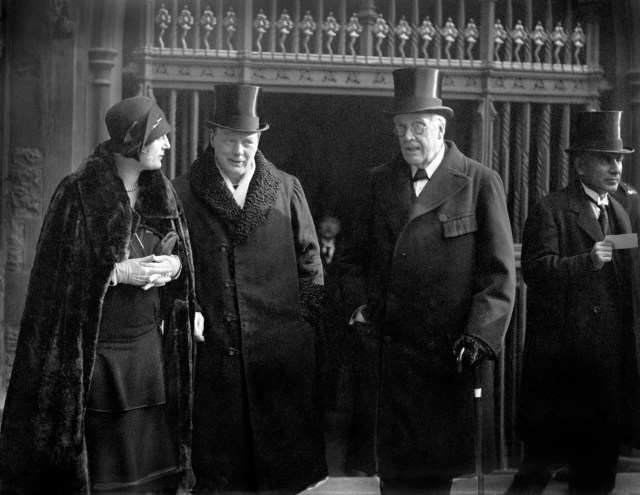Winston Churchill, second left, with former Prime Minister Lord Arthur Balfour. Sport and General/S&G Barratts/EMPICS Archive

In April, I wrote about C Thi Nguyen’s distinction between ‘echo chambers’ and ‘epistemic bubbles’. Both are aspects of groupthink, but while epistemic bubbles stop people from encountering facts and arguments they might disagree with, echo chambers are about causing people to distrust alternative viewpoints (whether encountered or not).
Writing for CapX, the pollster Matt Singh adds a third concept – the “salience gap”.
This one is about what those claiming expertise in the field of communications call ‘cut through’. To make an impact, a message has first to be heard; then it has to be trusted; and, finally, it has to be thought both relevant and important –i.e. salient.
Singh calls this the salience gap because of the chasm between the preoccupations of a small group of politicians and political journalists and what the general public considers to be worth paying attention too:
“Imagine being on an island where more than one in five people have never heard of Cambridge Analytica, gammon is an old-fashion pork cut, 78 per cent of people don’t talk about politics most days, and 99 per cent of people don’t watch Prime Minister’s Questions.
“In fact that island exists, and you may well be on it now. It’s called Great Britain.”
The gammon controversy was a small, if nasty, storm-in-a-teacup stirred-up by, and largely limited to, political Twitter in the UK. However, the Cambridge Analytica story had trans-Atlantic repercussions:
“For weeks this story occupied the news, and political Twitter. It would be difficult to go near either, at any point during that period, without hearing the story or the fierce debate that it prompted.
“Yet when we asked the public, in polling conducted at the height of the scandal and published here for the first time, 21 per cent said they had not recently heard any news story about social media or data privacy. “
They probably did hear or see something about it, but clearly it didn’t register. What’s more the true number is probably higher than 21%, because, as Singh explains, there are always some people who claim to be familiar with a news story even when they’re not.
Then we need to add in those who do genuinely recall the story, but don’t consider it that important:
“But even if the public know about a story, do they care? Theresa May’s disastrous 2017 speech to the Conservative Party conference was covered extensively, and many politicos took to Twitter to describe it as an ‘epitaph’ to her political career, while in reality it made almost no difference.”
It made no difference, because what made Theresa May’s speech “disastrous” was that she had a coughing fit. The commentariat saw it as symbolic; the public saw it as a bit of bad luck – not that most of them pay much attention to party conference speeches anyway.
Even when some event does move public opinion, the effects are usually short-lived – leaving a tiny number of stories with a lasting impact.
Arthur Balfour, Prime Minister of Britain from 1902 to 1905, may have been the last politician to acknowledge this truth. It was he who was supposed to have said: “Nothing matters very much and very few things matter at all.” Refined flippancy was very much Balfour’s thing, but in respect to the discipline of ‘news management’ he wasn’t far off.
In our own time, the more thoughtful kind of politician will privately admit the same thing, but that doesn’t stop politics – and, more seriously, policy making – from revolving around stories that make no real difference to public opinion, let alone the true state of the world.
Why do they do it, then? Why, given what people like Matt Singh can tell them about its ultimate insignificance, do the politicians, the press officers, the journalists, the lobbyists and the PR industry continue to chase one another’s tails?
Sophocles is said to have likened the male libido to being chained to a lunatic. Contemporary politics is chained to another lunatic – obsession with the news.
It has massively biased the culture of politics to those whose thoughts and actions are fast but shallow, attention grabbers with nothing to give.










Join the discussion
Join like minded readers that support our journalism by becoming a paid subscriber
To join the discussion in the comments, become a paid subscriber.
Join like minded readers that support our journalism, read unlimited articles and enjoy other subscriber-only benefits.
Subscribe